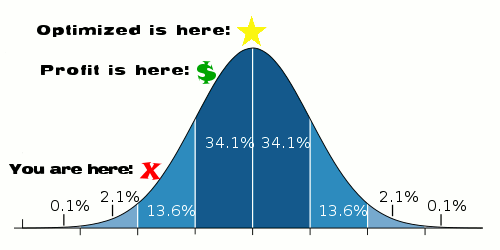
Who is vetting this Internet and deleting all the misinformation?
Yes, that is a nice idea, but let’s face it – there is a lot of information online, and it cannot all be true. Let’s consider how false information is often deemed true, true information is deemed false, and how people decide for themselves what is “true” or “false”.
Like it or not, the things people believe are often based on what they want to believe – and what others around them believe. We are each influenced very uniquely, and whether marketing an agenda or defending ourselves, it is important to recognize those influences.
Facts are commonly disregarded, in favor of more subjective means of decision making such as societal perception and emotion. Allow me to give you examples.
I recently read an article produced by ABC News about “Pink Slime” being added to ground beef products. It has been in the news a lot, recently. What they call “Pink Slime” is made up of scraps of meat that would be otherwise wasted, but instead are finely ground and processed to be mixed with other ground beef. The beef industry calls it “Lean, Finely Textured Beef” or “LFTB”. It has been used for over 20 years in America’s food supply, but news agencies recently uncovered a great opportunity to make a sensational story.
Questioning Pink Slime and Industry Agendas
Maybe Pink Slime is horrible stuff, and maybe it is not. That’s not the point I am after. Regardless of whether it is good or bad, it brought up some thoughts about people’s system of beliefs and reactions to things they read. On either side of the topic, there are people who will strongly believe in their viewpoint, but the side that many people will believe is the one which creates the stronger emotional draw.
The article was produced by a large news agency, and pretended to be journalistic, but there was a strong slant against the use of beef additives. As I read through the comments, it was obvious how it influenced others. In fact, there were only a few who questioned the source reliability and bias. It emphasized how people react to fact or fiction based on emotion, and in this case the emotion was influenced by presentation.
When something affects people emotionally, and they can personally identify with the topic, they are far more likely to find something believable. If they have a connection of trust with the source, it becomes even more believable. For example, I could probably write a convincing story about green pixie dust, and it would seem a lot more “true” to long-time readers and friends than to people who do not know, like, or respect me. It would be even more believable if I created an emotional attachment and led people to believe there is something important at stake for them.
The topic of Pink Slime has a lot of people up in arms, demanding tighter government regulation of “Lean, Finely Textured Beef”. The comments on the ABC News article expressed anger toward the evil companies using it, and the evil government that had surely been paid off to allow its use. I was a bit surprised nobody claimed it had killed their pet unicorn or had spawned a new sub-species of humans that can only eat through a straw.
The readers responded very emotionally, but only a few pointed out unbiased and unemotional facts about pink slime. That ability to move people away from facts or toward the facts to support a particular viewpoint is how marketing works at its best – and its worst.
In another article on Discovery.com, the concerns of Pink Slime were addressed quite differently – based on the “Ick Factor”. Here is a quote from the article titled “PINK SLIME: PSYCHOLOGY OF THE ICK FACTOR“.
Part of the psychology behind the Ick Factor is labeling. The language we use when we identify things influences how we interpret them. We can call an old car “used” or “pre-owned;” we can call civilians killed in wartime “men, women, and children” or “regrettable collateral damage.” And we can call processed beef parts “pink slime” or we can call it “boneless lean beef trimmings.”
The article also considered Jell-O, but it seems far fewer people complain about gelatin products. I will give you another quote to consider.
The beef industry may point out that meat prices will skyrocket without pink slime. Maybe it is true. Maybe this USDA regulated meat product is safe and nutritious. Maybe it is not. What we can be certain of is that there are multiple agendas involved in its discussion, and the facts will “bend” based on who is presenting them, how they are presented, and to whom.
Once something of this emotionally-charged level of interest is presented, society and its inherent emotion-based process will prevail – one way or the other, and for better or worse.
Do You Ever Question Politics? Let’s Have Some Fun!
Another very easy way to explore this type of emotional “fact-checking” (gut checking) is to look at politics. It is a presidential election year in USA, so politics is on a lot of minds. Let’s consider how we make things feel more believable and “true” based on personal experience, influence from the people around us, and emotional attachments. Make no mistakes about this, because none of us are fully immune.
Many people identify with a given political party based on how they were raised, where they work, where they live, or other societal input. It is very unreliable, but most people have a hard time accepting that they may be getting the wrong story – or at least a story very tainted with emotion.
With regard to politics, once people choose their political party, they will often remain influenced by that group and will base their views on the group’s influence.
Let’s have some fun examining the two popular political parties in America, and how people of one political party may view the other. Let’s also consider how rigid people are in their beliefs and unlikely – or even incapable – to acknowledge varying viewpoints with flexibility and fairness.
Democrats Defined:
Tree-hugging fanatics who hate companies, love abortion, don’t work or work very little, and complain about economy but think the government economy-fairy should keep producing more money. Democrats commonly believe that if the government grows large enough, it will protect us from ourselves, and we can all have public-sector jobs while we let pixies, gnomes, unicorns, and other fantasy taxpayers produce the tax dollars needed to cover our salaries. Democrats are generally poor, because earning money is considered evil and corrupt. They have too many children, and they only vote when republicans are trying to take away their free government cheese. Democrats are likely to be seen protesting against the organization that writes their paycheck (unless it’s the government). They love to protest things whenever they are not busy cleaning up an environmental disaster and wiping the crude oil from little a kitten’s eyes after some idiot republicans decided to drill for oil instead of thinking globally and buying it from those nations we should work harder to get along with. A hug is always the best answer to political or religious unrest, and our enemies would stop plotting to attack America if we just gave more hugs. Oh, and let’s not forget that most democrats are either gay, bisexual, or have some sort of sexual perversion.
Republicans Defined:
Wealthy religious zealots who think women should make babies and stay in the kitchen. They despise the working class, unless it is to manufacture weapons or go fight in the latest war. They pray before they make any policy decisions, and if they pray extra hard, God will make them wealthy enough to control more industries, and countries. They are generally rich, rude, self-centered, and want to control the universe while making slaves of democrats. Republicans enjoy destroying our planet and are likely to be seen driving a Hummer while eating an endangered spotted owl sandwich on their way to the whale hunting expedition where they will crash into an oil tanker and set a glacier on fire, thus producing more global warming and sea level rise. Then they can enslave more democrats to clean it up … they always have a sneaky agenda like that. In fact, it is undoubtedly republicans who came up with the idea for Pink Slime – probably as a way to sneak brain-numbing drugs into our food supply and make us agree with whatever they say. They lie, too … almost always. Regarding their sexuality, it is amazing there are still any republicans left, because according to them, sex is taboo. If they do have sex, there will surely be another republican voter on the way, because they don’t believe in birth control.
I know you nodded your head or identified with something in those stereotypes. I hope you did not identify too perfectly either way, but I’m trying to make a point.
The point is that people think in packs. It is generally true that people make decisions about what they accept as fact, based on the people around them, combined with their own experiences, and their own desire to believe it. The presentation is critical, both in how it is presented and to whom.
Know This About Marketing!
I hope you can see how the ideas here are very important factors in your marketing approach. If you do not reach the right audience and understand how people are influenced, it is easy to waste a lot of marketing resources.
Getting these principles right can create a lot of great business opportunities, but I must caution you to be very careful, too. The knife cuts in both directions. If you are falling prey to the emotional pull of the Internet’s popular notions of getting rich quick and easy with low efforts, it’s time to get a checkup from the neck up. That idea is popular and has a lot of emotional draw, but does it really settle right with you?
I guess you could say I am a bit of a whistle-blower about bad information online. I have explained the common SEO lies and publicly called out social media frauds. I try to encourage critical thinking, but perhaps understanding what leads people to believe something that is otherwise irrational or unbelievable is the best way to keep you safe from misinformation.
Now, please consider how believable something can become if you really want to believe it, and if others around you believe it, too. Then, perhaps the next time somebody tries to sell you their new variety of success in a box or easy-money green pixie dust, you will better understand how they make it so appealing.
Go ahead and tell me what you think about Pink Slime, democrats, republicans, marketing, or whatever this brings to mind for you.
I want to add a timely personal and professional observation.
Even in my present seemingly fact-based search for a new company to work for, these factors I pointed out here play a huge role with both parties. While I search for the perfect company with all the right “facts”, something that means even more is that I will fit well with the team and feel good about my work.
Wise companies understand this, and when they look at my résumé, it is merely a guideline. While my background is in operating and providing consulting services to successful businesses for over twenty years, my decision making comes from understanding people, business, where they intersect, and how the pieces all work together. My salary requirements depend on who I like, and their salary offerings will depend on their like and belief of my ideology, personality, and my specific fit with their people, and their business agenda.
This does not fit into a single sales pitch, and neither do many of the decisions the public will make about your brand, or your products.
These intricacies of people are what creates success at every scale of a business. That is why I expect the right company to invite me for an interview to learn more before making me an offer. Otherwise, they would just blindly email me the job offer based on simple facts. I’m not counting on that, and I don’t believe you should, either.
Build your brand, know who you are addressing, and give them the facts – but never neglect how the real decision making unfolds across a group, and how that group is influenced.
Podcast: Play in new window | Download








